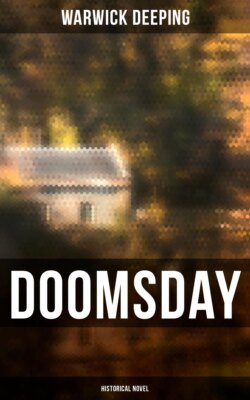Читать книгу Doomsday (Historical Novel) - Warwick Deeping - Страница 14
На сайте Литреса книга снята с продажи.
2
ОглавлениеAt eight o'clock on a moonlit March night a young woman went out with a jug in quest of milk. For Ransford, the Carslake doctor, expected all day, had not arrived at "Green Shutters" till seven o'clock, and had shown himself a little testy, as an overworked man will. Two old people in bed and coughing in chorus and both with temperatures, and why hadn't Mary sent for him before? As though doctor's bills were to be incurred with frivolous recklessness! Ransford had warmed his hands and ordered milk, meat essence, junket. He had promised to send down some medicine by a boy on a bicycle.
Hence Mary's quest for milk, for in the larder she had found just enough to cover a lump of sugar in the bottom of a breakfast cup. She knew that she had only to knock at the green door of the "Oast" in order to command immediate devotion, but she did not knock at poor Coode's door. She tried the Perrivales, to be met by Phyllis' red head—and a "So sorry, but I don't think we have got a drop. Dad had the last in his coffee." She hesitated outside the Brownlows, and then went on down the cinder track and out into the road. She would find milk at "Doomsday," and she faced the full moon and saw it hanging like a round shield behind the trunk of one of the Six Firs. There was not a cloud in the sky. She looked up at the zenith, though the stars were dim because of the moonlight, and the Milky Way—invisible—trailed symbolically above her head.
Where the lane began to descend she heard the dry rustling of last year's oak leaves shivered over by a little wayward breeze; the gleam of the pond appeared, and upon it the very black shadows of the two ilexes. The moonlight splintered itself upon the larches. She went softly, to pause by the pond, persuaded to loiter there a moment by her own self-consciousness and the night's mystery. She fancied that she could see a light shining beyond the trunks of the larches, and she watched it for a moment as she went on past the pond. She opened the gate, hesitated and was guided by the light. A little below her lay the farm buildings, very black, and with their roofs glimmering a little, and as she followed the path along the edge of the larch plantation she felt like a woman playing the part of a timid child. But how absurd! To thrill a little over the fetching of a jug of milk from a farmhouse on a moonlight night in March!
She reached the yew hedge and was puzzled. Where was the door? In the wall facing her or over there where the house sent out a dark projection? Straight ahead she saw a window all a-flicker with the light of a fire, and it seemed to her that a weedy path went that way. She tried it, and saw the three stone steps and the leaded hood over the door.
She was on the very point of knocking when a sound surprised her, three deep rich chords played upon a piano. Her hand was restrained. Those prelude sounds were followed by one of Chopin's ballades, played as a strong man might be expected to play it, with a largeness of touch and a good deal of feeling. She was astonished. But why—astonishment. A man might be a farmer and yet love music. Her first thought had been that Furze was the owner of a pianola, but a moment's listening told her that the music was made by human hands.
She stood and heard it out, the white jug held against her body and between her two breasts. Her knock, when it came, was rather tentative and timid. It was answered by the barking of a dog. Then she heard footsteps, and the door was opened.
